External links
- The Quintessence of Ibsenism at the Internet Archive.
 The Quintessence of Ibsenism public domain audiobook at LibriVox
The Quintessence of Ibsenism public domain audiobook at LibriVox
The Quintessence of Ibsenism is an essay written in 1891 by George Bernard Shaw, providing an extended analysis of the works of Norwegian playwright Henrik Ibsen and of Ibsen's critical reception in England. By extension, Shaw uses this "exposition of Ibsenism" [1] to illustrate the imperfections of British society, notably employing to that end an imaginary "community of a thousand persons," divided into three categories: Philistines, Idealists, and the lone Realist.
The essay originated in response to a call for papers from the Fabian Society in the spring of 1890, "put forward under the general heading 'Socialism in Contemporary Literature.'" [2] Shaw read the original paper, "the first form of this little book" at the St. James's Restaurant on 18 July 1890. [3]
Shaw devotes the piece largely to a discussion of Ibsen's recurring topic of the strong character holding out against social hypocrisy, while acknowledging in his essay's final sentence that the quintessence of Ibsenism is that "there is no formula". [4]
The classification of an individual character into one of the three categories depends on his use or rejection of ideals, which Shaw views as masks which "hide the face of […] truth". [5] : 3–18 Idealists, as their name indicates, rely exclusively on the use of masks; a realist insists on their removal. The Philistine, term for which Shaw is indebted to Matthew Arnold, neither constructs nor removes masks, content not to question reality.
According to Shaw, "[o]ut of a thousand persons […], there are 700 Philistines, 299 idealists, and only one lone realist". [5] : 3
Shaw, unlike Arnold who viewed Philistines as obstacles to human and cultural progress, constructs this type as relatively harmless though it includes the majority of society. Philistine characterization varies widely in Shaw's novels and plays, and becomes less and less frequent in his later works. The Philistine is often likeable, endowed with athletic ability, unpretending and credulous. Examples of this type exhibit a range of social backgrounds, Clod including the aristocracy and professions such as the army, the church, and politics. Johnny Tarleton in Misalliance is an ordinary, vaguely incompetent business man; Colonel Daniel Craven in The Philanderer is a well-meaning, gullible retired officer. [5] : 20 In his serial drama In the Beginning, Shaw casts Adam himself as Philistine, perhaps allowing an explanation for the sheer numbers of the Philistine type today. [5] : 24
The idealist type is, rather than the Philistine, the focal point of Shaw's critique of British society. As active rather than passive, the idealist is to be considered dangerous due to his desire to uphold and defend values such as duty and altruism at the expense of individual life and happiness. He is characterized by a "devotion to romantic illusions" such as that of honor and self-sacrifice and the "plausible" excuses with which he seeks to justify the extremes of his conduct (which invariably consist of an "attack on the nonconformist". [5] : 25 A trait common to all idealists is the tendency to enhance the aesthetic value of (and thus reinforce the power of) everything linked with the establishment and with the perpetuation of family life. The idealist confers an inordinate importance to love and sex. A prime example of the idealist is Marian Lind who elopes with an American inventor in The Irrational Knot. [5] : 25–34
Although Shaw denied portraying either villains or heroes in his plays, he clearly pits the idealist against the realist in a manner which suggests the typological superiority of the latter. Often cynical, opinionated and characterized by independence (due to a diffuse mistrust of others), the realist is first and foremost a skeptic. In Men and Supermen, Shavian critic Arthur H. Nethercot divides the realist type further into Diabolonians (rebels who particularly enjoy shocking conventional and orthodox sensibilities), the Disillusioned (characters who undergo a series of disillusionments in order to become realists) and the Nature Worshipers (who acknowledge the power of Nature and its influence). [5] : 73–74
A leader, the Superman is an inherently political figure. A very rare type, Shaw endows the Superman—which Shaw insists is not based on Nietszche's conceptual use of the term—with the exemplary qualities mankind must develop in order to forestall and reverse its destructive tendencies. Although what these specific qualities are remains somewhat elusive, Shaw playfully constructs the picture of "some sort of goodlooking philosopher-athlete". [5] : 263 Clearly type-cast as a realist and practically as a new species, the Superman will, according to Shaw, "undoubtedly […] empty a good deal of respectable morality out like so much dirty water, and replace it by new and strange customs". Freedom from "common ideals", creativity, originality and a lucid understanding of human affairs emerge as defining characteristics. [5] : 264–267
The type of the Superman Nethercot also divides into three subcategories, that of Superman Past (of which Prometheus, according to Shaw, was the first specimen), which seems associated with failure, Superman Present, a non-historical character which does not correspond to any contemporary prototype, and Superman Future, which seems to point to an evolutionary development of man into Superman. Nethercot claims that "there are no real Supermen in any of Shaws' plays", with the possible exception of the Hermaphrodite of his Farfetched Fables . [5] : 285
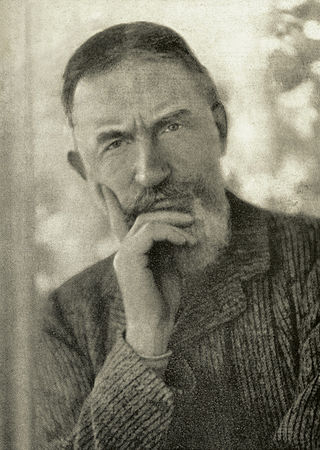
George Bernard Shaw, known at his insistence as Bernard Shaw, was an Irish playwright, critic, polemicist and political activist. His influence on Western theatre, culture and politics extended from the 1880s to his death and beyond. He wrote more than sixty plays, including major works such as Man and Superman (1902), Pygmalion (1913) and Saint Joan (1923). With a range incorporating both contemporary satire and historical allegory, Shaw became the leading dramatist of his generation, and in 1925 was awarded the Nobel Prize in Literature.
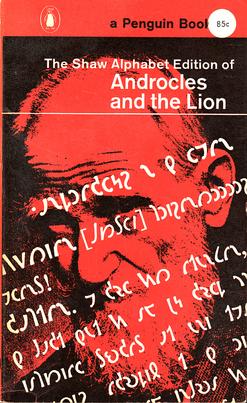
The Shavian alphabet is an alphabet conceived as a way to provide simple, phonemic orthography for the English language to replace the difficulties of conventional spelling using the Latin alphabet. It was posthumously funded by and named after Irish playwright Bernard Shaw.
The Übermensch is a concept in the philosophy of Friedrich Nietzsche. In his 1883 book, Thus Spoke Zarathustra, Nietzsche has his character Zarathustra posit the Übermensch as a goal for humanity to set for itself. The Übermensch represents a shift from otherworldly Christian values and manifests the grounded human ideal.
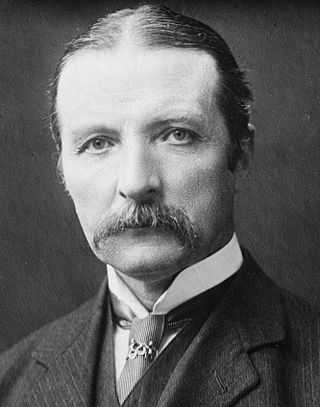
William Archer was a Scottish writer, theatre critic, and English spelling reformer based, for most of his career, in London. He was an early advocate of the plays of Henrik Ibsen, and a friend and supporter of George Bernard Shaw.

Ghosts is a play by the Norwegian playwright Henrik Ibsen. It was written in 1881 and first staged in 1882 in Chicago, Illinois, in a production by a Danish company on tour. Like many of Ibsen's plays, Ghosts is a scathing commentary on 19th-century morality. Because of its subject matter, which includes religion, venereal disease, incest, and euthanasia, it immediately generated strong controversy and negative criticism. Since then, the play has fared better, and is considered a “great play” that historically holds a position of “immense importance”. Theater critic Maurice Valency wrote in 1963, "From the standpoint of modern tragedy Ghosts strikes off in a new direction.... Regular tragedy dealt mainly with the unhappy consequences of breaking the moral code. Ghosts, on the contrary, deals with the consequences of not breaking it."
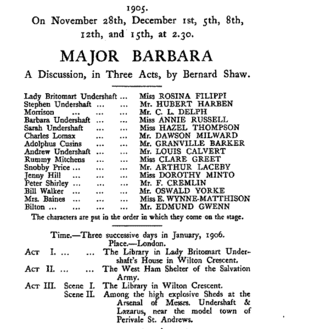
Major Barbara is a three-act English play by George Bernard Shaw, written and premiered in 1905 and first published in 1907. The story concerns an idealistic young woman, Barbara Undershaft, who is engaged in helping the poor as a Major in the Salvation Army in London. For many years, Barbara and her siblings have been estranged from their father, Andrew Undershaft, who now reappears as a rich and successful munitions maker. The father gives money to the Salvation Army, which offends Barbara because she considers it "tainted" wealth. The father argues that poverty is a worse problem than munitions and claims that he is doing more to help society by giving his workers jobs and a steady income than she is doing by giving people free meals in a soup kitchen.

Henry Arthur Jones was an English dramatist, who was first noted for his melodrama The Silver King (1882), and went on to write prolifically, often appearing to mirror Ibsen from the opposite (conservative) viewpoint. As a right-winger, he engaged in extensive debates with left-wing writers such as George Bernard Shaw and H.G. Wells.

Man and Superman is a four-act drama written by George Bernard Shaw in 1903. The series was written in response to a call for Shaw to write a play based on the Don Juan theme. Man and Superman opened at the Royal Court Theatre in London on 21 May 1905 as a four-act play produced by the Stage Society, and then by John Eugene Vedrenne and Harley Granville-Barker on 23 May, without Act III. A part of the third act, Don Juan in Hell, was performed when the drama was staged on 4 June 1907 at the Royal Court. The play was not performed in its entirety until 1915, when the Travelling Repertory Company played it at the Lyceum Theatre, Edinburgh.

Gog is the name of several fictional characters in the comics published by DC Comics. The first version first appeared in New Year's Evil: Gog #1, and was created by Mark Waid and Jerry Ordway.
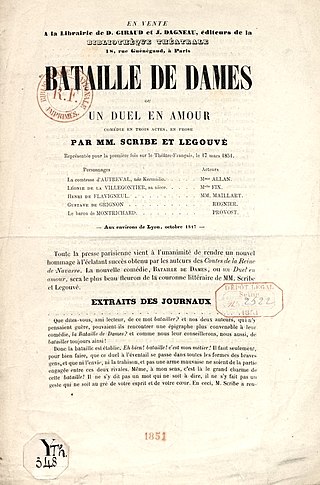
The well-made play is a dramatic genre from nineteenth-century theatre, developed by the French dramatist Eugène Scribe. It is characterised by concise plotting, compelling narrative and a largely standardised structure, with little emphasis on characterisation and intellectual ideas.
The Shaw Festival is a major Canadian theatre festival in Niagara-on-the-Lake, Ontario, the second largest repertory theatre company in North America. Founded in 1962, its original mandate was to stimulate interest in George Bernard Shaw and his period, and to advance the development of theatre arts in Canada.

St. John Emile Clavering Hankin was an English Edwardian essayist and playwright. Along with George Bernard Shaw, John Galsworthy, and Harley Granville-Barker, he was a major exponent of Edwardian "New Drama". Despite success as a playwright he died by his own hand, and his work was largely neglected until the 1990s.
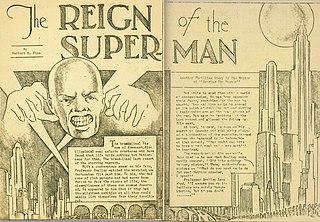
"The Reign of the Superman" is a short story written by Jerry Siegel and illustrated by Joe Shuster. It was the writer/artist duo's first published use of the name Superman, which they later applied to their archetypal fictional superhero. The title character of this story is a telepathic villain, rather than a physically powerful hero like the well-known character. Although the name is hyphenated between syllables due to it being broken between pages on the story's opening spread, it is spelled Superman in the magazine's table of contents and in the story's text.

In theatre, a box set is a set with a proscenium arch stage and three walls. The proscenium opening is the fourth wall. Box sets create the illusion of an interior room on the stage, and are contrasted with earlier forms of sets which contained sliding flaps and gaps between set pieces.
The Independent Theatre Society was a by-subscription-only organisation in London from 1891 to 1897, founded by Dutch drama critic Jacob Grein to give "special performances of plays which have a literary and artistic rather than a commercial value." The society was inspired by its continental forerunners, the Théâtre-Libre and Die Freie Bühne. The Society produced modern realist plays, mostly by continental European playwrights, on the London stage.

Hjalmar Hjorth Boyesen was a Norwegian-American author and college professor. He is best remembered for his novel Gunnar: A Tale of Norse Life, which is generally considered to have been the first novel by a Norwegian immigrant in America.
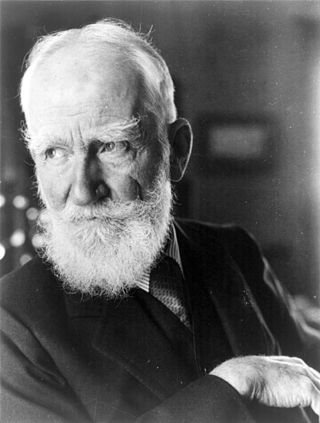
The Simpleton of the Unexpected Isles: A Vision of Judgement is a 1934 play by George Bernard Shaw. The play is a satirical allegory about an attempt to create a utopian society on a Polynesian island that has recently emerged from the sea.

Cymbeline Refinished (1937) is a play-fragment by George Bernard Shaw in which he writes a new final act to Shakespeare's play Cymbeline. The drama follows from Shaw's longstanding need to reimagine Shakespeare's work, epitomised by his play Caesar and Cleopatra and his late squib Shakes versus Shav.

Why She Would Not: A Little Comedy (1950) is the last play written by George Bernard Shaw, comprising five short scenes. The play may or may not have been completed at his death. It was published six years later.

Geneva, a Fancied Page of History in Three Acts (1938) is a topical play by George Bernard Shaw. It describes a summit meeting designed to contain the increasingly dangerous behaviour of three dictators, Herr Battler, Signor Bombardone, and General Flanco.
Shaw, George Bernard (1891). The Quintessence of Ibsenism. London: Walter Scott. OCLC 503993145.